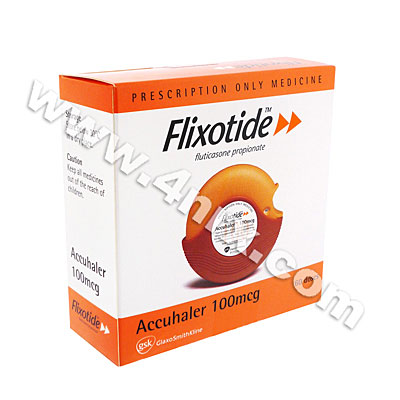 |
Home  Asthma Asthma  Flixotide Accuhaler (Fluticasone Propionate) Flixotide Accuhaler (Fluticasone Propionate) |
|
|||||||||
|
Flixotide Accuhaler (Fluticasone Propionate)
What is Flixotide Accuhaler (Fluticasone Propionate) used for? Flixotide Accuhaler (Fluticasone Propionate) is used to treat and prevent the symptoms of asthma, such as breathlessness and wheezing. This drug is a type of corticosteroid that works by reducing inflammation of the airways in the lungs, thereby helping to make breathing easier. It is also used to help treat and control symptoms of bronchitis and emphysema. How should I use Flixotide Accuhaler (Fluticasone Propionate)? Flixotide Accuhaler (Fluticasone Propionate) is inhaled orally, using the accuhaler. Patients should follow the directions of their physician on the correct usage of this device. The exact dosage required varies, depending on a number of factors, such as the patient's age, medical history, and the condition being treated. It is essential to consult your physician before taking this medication in order for the correct dosage to be prescribed. To administer the medication, you should first open the accuhaler, and hold it with the mouthpiece facing you. When you are ready to use it, place the mouthpiece to your lips, and breathe in deeply through your mouth, after which you should hold your breath for 10 seconds. If you have been prescribed two inhalations, you should repeat the previously mentioned steps. What are the side effects of Flixotide Accuhaler (Fluticasone Propionate)? Some side effects associated with Flixotide Accuhaler (Fluticasone Propionate) include:
You should consult your physician immediately if any of these side effects persist, or if any other more serious side effects occur, such as fatigue, muscular pain, blurred vision, fever or severe breathing problems. Please Note Strictly follow all instructions provided to you by your physician or pharmacist while using Flixotide Accuhaler (Fluticasone Propionate). Optimum and safe dosage can differ based on the patient and the condition being treated. As this medication may be unsafe for certain patients, it is essential you always inform your physician if you are pregnant or breastfeeding, as well as if you have any allergies, other illnesses, or ongoing health conditions, and if you are taking any other form of medication, supplements, or herbal products. Patients are advised to carry an ID card or bracelet which states that they are currently using corticosteroids. Immediately seek emergency medical care if you have any allergic or hypersensitive reaction. Common signs of a reaction include hives, swelling, skin rashes, chest pains, as well as trouble breathing or swallowing. 

|
|||||||||||||||||